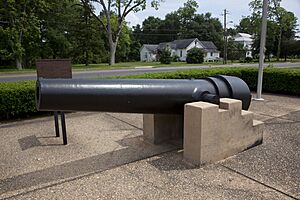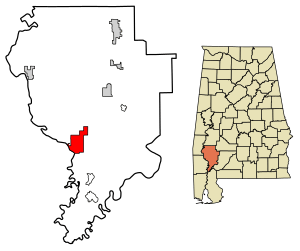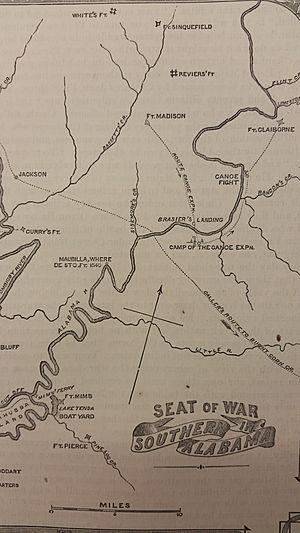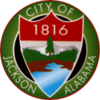Jackson, Alabama facts for kids
Quick facts for kids
Jackson
|
|||
|---|---|---|---|

Brooke rifle in front of the Jackson City Hall
|
|||
|
|||
| Nickname(s):
The Pine City
|
|||

Location of Jackson in Clarke County, Alabama.
|
|||
| Country | United States | ||
| State | Alabama | ||
| County | Clarke | ||
| Area | |||
| • Total | 15.83 sq mi (41.00 km2) | ||
| • Land | 15.64 sq mi (40.50 km2) | ||
| • Water | 0.19 sq mi (0.50 km2) | ||
| Elevation | 236 ft (72 m) | ||
| Population
(2020)
|
|||
| • Total | 4,748 | ||
| • Density | 303.60/sq mi (117.22/km2) | ||
| Time zone | UTC-6 (Central (CST)) | ||
| • Summer (DST) | UTC-5 (CDT) | ||
| ZIP codes |
36501, 36515, 36545
|
||
| Area code(s) | 251 | ||
| FIPS code | 01-38152 | ||
| GNIS feature ID | 0151874 | ||
Jackson is a city located in Clarke County, Alabama, in the United States. In 2020, about 4,748 people lived there. It's known as "The Pine City." Jackson was one of the few places in its county where selling alcohol was allowed.
Contents
Jackson's Location and Area
Jackson is found on the western edge of Clarke County. It sits on a small hill overlooking the eastern bank of the Tombigbee River. The city covers a total area of about 41 square kilometers (15.8 square miles). Most of this area is land, with a small part being water. Jackson is located across the Tombigbee River from Washington County, Alabama.
Climate in Jackson
Jackson has a warm climate. Summers are hot and humid, while winters are mild. The city gets a good amount of rain throughout the year.
| Climate data for Jackson, Alabama, 1991–2020 normals, extremes 1965–present | |||||||||||||
|---|---|---|---|---|---|---|---|---|---|---|---|---|---|
| Month | Jan | Feb | Mar | Apr | May | Jun | Jul | Aug | Sep | Oct | Nov | Dec | Year |
| Record high °F (°C) | 83 (28) |
84 (29) |
88 (31) |
95 (35) |
96 (36) |
103 (39) |
104 (40) |
104 (40) |
99 (37) |
98 (37) |
89 (32) |
86 (30) |
104 (40) |
| Mean maximum °F (°C) | 76.0 (24.4) |
78.5 (25.8) |
84.0 (28.9) |
86.6 (30.3) |
92.2 (33.4) |
95.3 (35.2) |
97.0 (36.1) |
96.6 (35.9) |
94.4 (34.7) |
89.1 (31.7) |
81.8 (27.7) |
77.9 (25.5) |
98.2 (36.8) |
| Mean daily maximum °F (°C) | 59.9 (15.5) |
64.1 (17.8) |
71.4 (21.9) |
77.5 (25.3) |
84.5 (29.2) |
89.5 (31.9) |
91.2 (32.9) |
91.2 (32.9) |
87.2 (30.7) |
78.7 (25.9) |
68.7 (20.4) |
61.9 (16.6) |
77.2 (25.1) |
| Daily mean °F (°C) | 47.9 (8.8) |
51.7 (10.9) |
58.4 (14.7) |
64.4 (18.0) |
72.1 (22.3) |
78.6 (25.9) |
80.8 (27.1) |
80.6 (27.0) |
76.2 (24.6) |
66.0 (18.9) |
55.7 (13.2) |
50.1 (10.1) |
65.2 (18.5) |
| Mean daily minimum °F (°C) | 36.0 (2.2) |
39.3 (4.1) |
45.4 (7.4) |
51.3 (10.7) |
59.7 (15.4) |
67.7 (19.8) |
70.5 (21.4) |
70.0 (21.1) |
65.3 (18.5) |
53.4 (11.9) |
42.6 (5.9) |
38.2 (3.4) |
53.3 (11.8) |
| Mean minimum °F (°C) | 20.1 (−6.6) |
23.4 (−4.8) |
28.3 (−2.1) |
36.3 (2.4) |
46.4 (8.0) |
59.1 (15.1) |
65.9 (18.8) |
63.5 (17.5) |
52.5 (11.4) |
36.9 (2.7) |
27.6 (−2.4) |
24.0 (−4.4) |
18.1 (−7.7) |
| Record low °F (°C) | 3 (−16) |
11 (−12) |
18 (−8) |
29 (−2) |
39 (4) |
48 (9) |
56 (13) |
57 (14) |
40 (4) |
28 (−2) |
18 (−8) |
6 (−14) |
3 (−16) |
| Average precipitation inches (mm) | 5.72 (145) |
5.46 (139) |
5.52 (140) |
4.74 (120) |
3.95 (100) |
6.26 (159) |
5.40 (137) |
5.17 (131) |
4.37 (111) |
3.75 (95) |
4.35 (110) |
5.52 (140) |
60.21 (1,527) |
| Average snowfall inches (cm) | 0.0 (0.0) |
0.0 (0.0) |
0.0 (0.0) |
0.0 (0.0) |
0.0 (0.0) |
0.0 (0.0) |
0.0 (0.0) |
0.0 (0.0) |
0.0 (0.0) |
0.0 (0.0) |
0.0 (0.0) |
0.0 (0.0) |
0.0 (0.0) |
| Average precipitation days (≥ 0.01 in) | 10.2 | 9.3 | 8.9 | 7.5 | 7.6 | 10.0 | 12.1 | 10.4 | 8.1 | 6.3 | 7.6 | 10.4 | 108.4 |
| Average snowy days (≥ 0.1 in) | 0.0 | 0.1 | 0.0 | 0.0 | 0.0 | 0.0 | 0.0 | 0.0 | 0.0 | 0.0 | 0.0 | 0.0 | 0.1 |
| Source 1: NOAA | |||||||||||||
| Source 2: National Weather Service | |||||||||||||
Jackson's Population and People
The number of people living in Jackson has changed over the years. Here's how the population has grown:
| Historical population | |||
|---|---|---|---|
| Census | Pop. | %± | |
| 1900 | 1,039 | — | |
| 1910 | 1,379 | 32.7% | |
| 1920 | 1,331 | −3.5% | |
| 1930 | 1,828 | 37.3% | |
| 1940 | 2,039 | 11.5% | |
| 1950 | 3,072 | 50.7% | |
| 1960 | 4,959 | 61.4% | |
| 1970 | 5,957 | 20.1% | |
| 1980 | 6,073 | 1.9% | |
| 1990 | 5,819 | −4.2% | |
| 2000 | 5,419 | −6.9% | |
| 2010 | 5,228 | −3.5% | |
| 2020 | 4,748 | −9.2% | |
| U.S. Decennial Census 2013 Estimate |
|||
Population in 2020
In 2020, Jackson had 4,748 residents. There were 1,775 households and 1,112 families living in the city.
| Race | Num. | Perc. |
|---|---|---|
| White | 2,379 | 50.11% |
| Black or African American | 2,154 | 45.37% |
| Native American | 20 | 0.42% |
| Asian | 36 | 0.76% |
| Pacific Islander | 1 | 0.02% |
| Other/Mixed | 112 | 2.36% |
| Hispanic or Latino | 46 | 0.98% |
Population in 2010
Back in 2010, Jackson had 5,228 people. About 28% of households had children under 18. Most households were either married couples or single people. The average age of people in Jackson was about 40 years old.
History of Jackson
Jackson was started in 1816. It was named after President Andrew Jackson. Before that, it had other names like Pine Level and Republicville.

During the Civil War, a fort was built by the Confederate army. This fort, called Fort Carney, was located on Carney's Bluff near the Tombigbee River. A cannon from that time is now displayed in front of the City Hall.
Jackson has four places that are listed on the National Register of Historic Places. These are the Jackson Historic District, Clarke Mills, Doit W. McClellan Lustron House, and J. P. McKee Lustron House.
During World War II, a camp was set up in Jackson. It held 253 captured German soldiers. The camp was open from April 1945 to March 1946. Many of these prisoners were from the Afrika Korps.
Jackson's Economy
The main industry in Jackson is timber. This means that businesses related to trees and wood are very important. Packaging Corporation of America has a large paper mill in the city. This mill is the biggest employer in Jackson.
Education in Jackson
Jackson has several schools and a college for students of all ages:
- Coastal Alabama Community College
- Jackson Academy
- Jackson Middle School
- Jackson High School
- Jackson Intermediate
- Joe M. Gillmore Elementary
- Walker Springs Baptist Church
Notable People from Jackson
Many interesting people have come from Jackson, Alabama:
- Ann Bedsole (born 1930), who was a member of the Alabama State Legislature.
- Stew Bolen (1902–1969), a former Major League Baseball player.
- Antonio Chatman (born 1979), an NFL wide receiver.
- Jimmy Outlaw (1913–2006), another former Major League Baseball player.
- Ray Prim (1906–1995), a former Major League Baseball pitcher.
- John "Jabo" Starks (1938–2018), a famous funk and blues drummer.
- Travis and Bob, a musical duo.
- Samaje Perine (born 1995), an NFL Running-Back.
See also
 In Spanish: Jackson (Alabama) para niños
In Spanish: Jackson (Alabama) para niños
 | Calvin Brent |
 | Walter T. Bailey |
 | Martha Cassell Thompson |
 | Alberta Jeannette Cassell |



